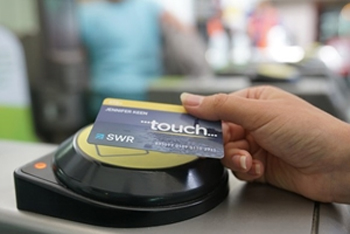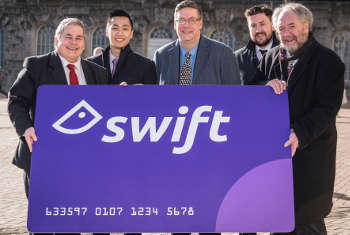Smart cards are still not universally interoperable across the rail network and a limited number of tickets are available in the format, despite a government pledge that they would be by now.
Nevertheless, both the rail industry and the Government claim to have met a target to ensure that smart cards are interoperable between different train operating companies (TOCs) by the end of last year.
Research by Transport Network has previously shown that even where employed, so-called ‘smart tickets’ such as smart cards and barcode tickets provide few benefits to passengers beyond the replacement of paper tickets with a paperless version. Very few facilitate genuinely flexible travel.

SWR's smart card is called Touch
Big claims disputed
The Department for Transport’s (DfT) 2018 Inclusive Transport Strategy argues that paperless tickets provide a benefit for ‘those who might find it difficult to use a ticket machine or ticket office to buy or collect their ticket’.
And the 2018/19 update to the strategy states that smart cards were planned to be interoperable, allowing travel across different Train Operating Companies (TOCs) by the end of 2019.
The recently published 2019/20 update fails to give an account of progress against this target.
A DfT spokesperson told Transport Network that the target ‘has been achieved’ but did not respond to an invitation to explain why this achievement was not cited in the update.
The claim that the target has been achieved is contradicted by the TOCs themselves.
Progress made but incomplete
Jacqueline Starr, chief operating officer at the Rail Delivery Group (RDG), which represents TOCs, told Transport Network: ‘Rail companies have invested in new infrastructure and technical upgrades to ensure passengers can use smartcards across the whole rail network, including on the most popular routes.’
However, a spokesperson for Govia Thameslink Railway (GTR), the UK’s largest rail franchise, suggested that the process was incomplete.
The spokesperson told Transport Network: ‘There is a nationwide drive to make all TOCs' smartcard systems interoperable. This involves altering the technology – chiefly the systems driving the ticket gates and the gates for the acceptance of each other's smartcards.’
Asked whether TOCs’ smartcards will open all other TOCs’ gates, the spokesperson replied: ‘No, not yet.’
The spokesperson added that although GTR’s The Key smartcard is fully interoperable with neighbouring TOCs South Western Railway (SWR), Southeastern and Greater Anglia: ‘There are times, at the moment, where some journeys prevent interoperability due to a particular route crossing multiple TOCs and one may not be interoperable with another.’
In addition, according to SWR’s online smart card map, its Touch smart card cannot be used to or from any stations between Epsom and Dorking in Surrey, a route where SWR runs services but where stations are operated by GTR under the Southern brand.
A spokesperson for SWR told Transport Network that this remains the case, adding: ‘You cannot currently use Touch between Epsom and Dorking as these are GTR managed stations. We are expecting these to be enabled in the near future.’
Other TOCs have told Transport Network that all TOC smart cards will open all other TOCs’ gates. In addition, tickets can be loaded onto one TOC’s smartcard from another TOC’s ticket machines.
West Midlands Trains (WMT) told Transport Network that its London Northwestern Railway smartcard is compatible at every station where the operator participates in the RDG’s national smartcard project.
WMT does not issue a smart card for its West Midlands Railway brand as it participates in Transport for West Midlands’ (TfWM) Swift smart card.
A TfWM spokesperson told Transport Network: ‘Swift uses the ITSO national standard, so unlike [Transport for London’s] Oyster can be used in any other area in the UK where ITSO-certified equipment has been rolled out.’
Ticket availability or going against the flow
Whether theoretical interoperability has been achieved across the network or not, research by Transport Network has established that ticket availability on smart cards remains limited.
A smart card issued by one TOC might be in theory interoperable with another’s ticket gate, but in practice it will only open the gate where the TOC that is the designated ‘flow owner’ for the specific journey has ‘enabled’ that journey for smart card, allowing the relevant ticket to be sold.
In addition, TOCs have mainly used smart cards to provide a plastic replacement for paper season tickets, without providing flexible or part-time ticketing options. The industry claims that this reflects consumer demand but it means that many journeys are only possible on smart cards with season tickets.
Despite pledging in its 2017 Strategic Vision for Rail that ‘both ITSO [smart card] and barcode tickets will be accepted for travel on almost all of the network’, the DfT has since stated that ‘barcodes [are] ideal for long-distance journeys and smartcards [offer] the best option for season tickets’.
Nevertheless, the availability of smart card season tickets across TOC services is limited.
GTR’s the Key does not allow single or return tickets to be loaded (although it has a pay-as-you go option within its network) and not all journeys are available on season ticket.
In relation to season tickets, the GTR spokesperson told Transport Network: ‘Not all routes will have been enabled, meaning not all tickets would be available to buy on a smartcard. Decisions to enable routes are down to individual TOCs which own each “flow” and tend to be based on level of passengers using that flow.’
Passengers living in Guildford, Surrey can travel to and from Reading on GWR or CrossCountry services using a season ticket on SWR’s Touch smart card. It is also possible to put a season ticket from Guildford to Oxford on the Touch smart card, but not a season ticket to Oxford Parkway.
However, no single or return journey is available on Touch from Guildford to Reading. This includes carnet tickets, where 10 Anytime Day Return tickets can be bought in advance for a 5% discount, representing the closest SWR commuters can currently get to a part-time season ticket.
An SWR spokesperson told Transport Network: ‘This is because GWR are the flow owner and we only set Carnets for SWR owned flows.’
GWR is owns by First Group, which also owns 70% of SWR and also has a Touch smart card.

TfWM's Swift card can be used across transport modes
One version of TfWM’s Swift card is similar to the Oyster system, and provides capped, pay-as-you go travel across transport modes in the region. Season tickets are loaded onto a different format of Swift card, which has the passenger’s photo. Neither format allows single or return tickets to be pre-loaded.
A TfWM spokesperson told Transport Network that season tickets are available to some destinations outside its region, but not all, because the routes have not been smart card enabled, but added: ‘We are working with other areas outside the West Midlands to bring the Swift system to these areas.‘
The RDG told Transport Network that when deciding which tickets to make available on smartcard, operators prioritise what they think customers want while considering operational capacity and capability, including the need for at-station and on-train smartcard validation capability and staff training.
COO of RDG, Jacqueline Starr, told Transport Network: ‘Train operators are making careful choices to prioritise smartcard tickets where customers want them and offer barcodes or mobile tickets instead when that will improve people’s journeys, helping them to travel with confidence.’
It is clear that, even where theoretical interoperability exists, TOCs are choosing to limit smart card ticket availability based on cost and resource issues. This includes the existence of stations without ticket gates, where TOCs would need to provide staff with handheld validation equipment to check tickets.
Register now for full access
Register just once to get unrestricted, real-time coverage of the issues and challenges facing UK transport and highways engineers.
Full website content includes the latest news, exclusive commentary from leading industry figures and detailed topical analysis of the highways, transportation, environment and place-shaping sectors.
Use the link below to register your details for full, free access.
Already a registered? Login